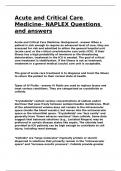Acute and Critical Care
Medicine- NAPLEX Questions
and answers
Acute and Critical Care Medicine- Background - answer When a
patient is sick enough to require an advanced level of care, they are
assessed for risk and admitted to either the general hospital unit
(acute care) or the critical care/intensive care units (ICU). If their
illness has a high probability of imminent or life-threatening
deterioration, treatment in the ICU is needed. The goal of critical
care treatment is stabilization. If the illness is not as imminent,
treatment in a general medical (acute) care unit is acceptable.
The goal of acute care treatment is to diagnose and treat the illness
to return the patient to their normal state of health.
Types of IV Fluids - answer IV fluids are used to replace losses and
treat various conditions. They are categorized as crystalloids or
colloids.
*Crystalloids* contain various concentrations of sodium and/or
dextrose that pass freely between semipermeable membranes. Most
of the administered volume does not remain in the intravascular
space (inside the blood vessels), but moves into the extravascular
space or the interstitial space. *Crystalloids* are *less costly* and
generally have *fewer adverse reactions* than colloids. Some data
suggest that balanced solutions (e.g., Lactated Ringers) may be
preferred in certain disease states like sepsis. The chloride load
provided to ICU patients can be high enough to contribute to cell
injury, including renal damage.
*Colloids* are *large molecules* (typically protein or starch)
dispersed in solutions that primarily remain in the *intravascular
space* and *increase oncotic pressure*. Colloids provide greater
,intravascular volume expansion than equal volumes of Crystalloids,
but are *more expensive* and *have not shown clear clinical benefit*
over Crystalloids.
IV Fluid Products - answer There are many different Crystalloid and
Colloid products available on the market, and many are available in
combination formulations (e.g., D5NS). *Dextrose*-containing
products are used when water is needed *intracellularly*, as these
products contain "*free-water*." *Lactated Ringers (LR)* and
*Normal Saline (NS)* are the most common drugs used for *volume
resuscitation* in *shock states*.
*Albumin* is the most commonly used *colloid*. It is particularly
useful when there is *significant edema (e.g., cirrhosis)*. Albumin
should not be used for nutritional supplementation when serum
albumin is low. Hydroxyethyl Starch use is limited secondary to its
*boxed warning* to avoid use in critical illness (including sepsis)
due to *mortality* and renal injury.
Common Crystalloids and Colloids - answer Crystalloids:
- *5% Dextrose (D5W)*
- *0.9% NaCl (normal saline, NS)*
- *Lactated Ringers (LR)*, contains NaCl, KCl, CaCl2, Na-Lactate
(lactate is converted to bicarbonate).
- Multiple electrolyte injection *(Plasma-Lyte A)*
Colloids:
- *Albumin 5%, 25% (Albutein, AlbuRx*, Albuked, Flexbumin, others)
- Dextran (Dextran 40, Dextran 70)
- Hydroxyethyl Starch (Hespan, Hextend)
Electrolyte Disorders- Overview and Common Disorders - answer
Anyone, including outpatients, can experience electrolyte disorders,
,but these are more common in hospitalized and critically ill
patients. There are many causes, and some drugs deplete
electrolytes and cause acute deficiency. Electrolyte abnormalities
can lead to severe complications (e.g., seizures, cardiac
arrhythmias, coma, and death). Protocols to replace electrolytes
should be followed in order to avoid toxicity.
The most common electrolyte disorders are:
1. *Sodium Disorders*
- *Hyponatremia* (Hypovolemic, Hypervolemic, or Euvolemic)
- *Hypernatremia*
2. *Potassium Disorders*
- *Hypokalemia*
- Hyperkalemia
3. *Magnesium Disorders*
- *Hypomagnesemia*
- *Hypermegnesemia*
4. *Phosphorus Disorders*
- Hyperphosphatemia
- *Hypophosphatemia*
Hyponatremia- Overview - answer *Hyponatremia (Na < 135 mEq/L)*
can develop from many causes and is usually not symptomatic until
the sodium is <120 mEq/L, unless the serum level falls rapidly.
Hyponatremia is classified according to serum osmolality and
volume status:
1. Hypotonic *Hypovolemic* Hyponatremia:
, - Typically caused by diuretics, salt-wasting syndromes, adrenal
insufficiency, blood loss, or vomiting/diarrhea. The treatment is to
correct the cause and *administer NS IV solutions*.
2. Hypotonic *Hypervolemic* Hyponatremia:
- Typically caused by fluid overload from cirrhosis, heart failure, or
renal failure. *Diuresis with fluid restriction* is the preferred
treatment.
3. Hypotonic Isovolemic Hyponatremia:
- Typically caused by the Syndrome of Inappropriate Antidiuretic
Hormone (SIADH). Treatment includes fluid restriction or diuresis.
Demeclocycline is frequently used off-label for SIADH.
Hyponatremia- Treatment - answer The *Arginine Vasopressin (AVP)
Receptor Antagonists (Conivaptan or Tolvaptan)* may be used to
treat *SIADH and Hypervolemic Hyponatremia*. They increase
excretion of *free water* (water without electrolytes) while
maintaining sodium. The role of these drugs is still being
determined, as they are more expensive than 3% Saline and use
beyond 30 days with the oral product Tolvaptan (Samsca) is not
recommended.
Hyponatremia should not be corrected quickly. *Correcting sodium
more rapidly than 12 mEq/L over 24 hours* can cause *Osmotic
Demyelination Syndrome (ODS) or Central Pontine Myelinolysis*,
which can cause *paralysis, seizures, and death*. Conservative
correction goals are advised, as accidental overcorrection is
common. Administration of Desmopressin (synthetic Arginine
Vasopressin, or Anti-Diuretic Hormone [ADH]) reduces water
diuresis and can help avoid overcorrection.
Arginine Vasopressin Antagonists- Drugs, Formulations, Dosing -
answer 1. Conivaptan (Vaprisol), injection
- Non-selective AVP Antagonist (blocks Vasopressin 1A and
Vasopressin 2 Receptors)




